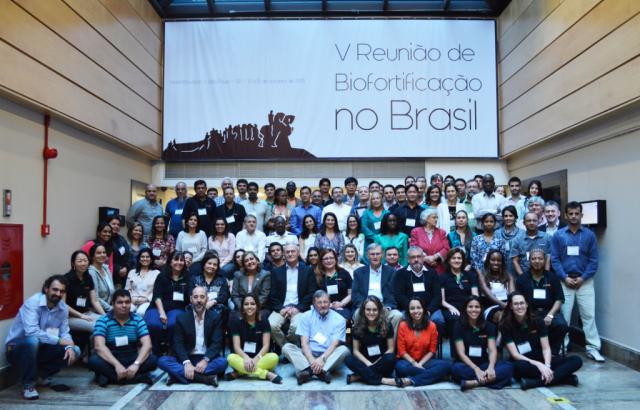International experts in nutritional security assert that Brazilian biofortification is promising
International experts in nutritional security assert that Brazilian biofortification is promising
During the V Biofortification Annual Meeting in Brazil, experts connected to biofortification research institutions could assess and comment on studies on biofortified cultivars in different areas such as breeding, agronomic biofortification, nutrition and products, technology transfer, and impact assessment. Wolfgang Pfeiffer (International Tropical Agriculture Center / HarvestPlus), Ross Welch (United States Department of Agriculture / Agricultural Research Service), Erick Boy (HarvestPlus), Yery Mendoza (Nestle Research Center), Jere Haas (Universidade de Cornell), Carolina Gonzalez (International Tropical Agriculture Center), Manfred Zeller (HarvestPlus), Delia Amaya (International Union of Food Science and Technology), Meike Andersson (International Tropical Agriculture Center / HarvestPlus), Eliab Simpungwe (HarvestPlus) and Parminder Virk (International Crops Research Institute for the Semi-Arid Tropics) underscored the results that have already been achieved, especially concerning on-demand breeding of fortified varieties and on the broadening of activities and of partnerships in the Brazilian Northeast. Among the aspects to be improved are incentives to the voluntary purchase of seeds and the establishment of social and public policy related to biofortification.
Yery Mendoza, a researcher for the Nestle Research Center in Switzerland, deems biofortification to be a sustainable and healthy alternative to meet the demand generated by populational growth. "It is a matter of time until biofortified foods reach a commercial scale. Nestlé and the private sector in general will take on the role of bringing such food to people's tables, creating safe channels for the trading of such products", Dr. Mendoza concludes.
Embrapa Food Technology researcher Marília Nutti believes that during the meetings with team members from other countries' biofortification programs, it is fundamental to learn from successful experiences such as the case of Rwanda, in which approximately half a million farmers are responsible for producing iron-rich bean varieties. Dr. Nutti, who is also the leader of the Brazilian biofortification program (BioFORT Network), affirms that positive results achieved with efficacy studies are of utmost importance. "Dr. Erick Boy has shown several research examples proving the benefits of these traditionally bred varieties. The ingestion of sweet potato has nearly doubled vitamin A levels in individuals in some countries, on top of reducing the prevalence and length of diarrhea in children who had such micronutrient deficiency, a fact that occurred in Mozambique."
On October 20, some of the event participants gathered to form a foreign delegation that, alongside BioFORT network representatives, met with the mayor of Magé, Nestor Vidal, in Rio de Janeiro, for a Field Day in the region, during which they could observe an experimental field with biofortified varieties of sweet potato, maize, beans, and cassava. There was also room for the exchange of experiences with local farmers and for explanations on the work conducted with the state Secretariat of Agriculture and on the upcoming activities that will include the state Secretariat of Education, including the incorporation of such foods in school meals.
More about the BioFORT Network
The BioFORT network is responsible for contemplating all food biofortification projects in Brazil and currently coordinated by Embrapa. Among its main partners is the HarvestPlus program, an alliance of research institutions operating in Latin America, Africa and Asia with funding from the Bill and Melinda Gates Foundation, the World Bank, and international development agencies. BioFORT network projects are also funded by Embrapa, CNPq, and several state research support foundations. Based on conventional genetic improvement techniques, the micronutrient content of the following cultivars is selected and enhanced: squash, rice, sweet potatoes, beans, cowpeas, cassava, maize, and wheat. This generates new crops with higher vitamin A, iron, and zinc contents, strengthening the fight against human micronutrient deficiency, also known as hidden hunger, which provokes diseases such as anemia and night blindness. The BioFORT network does not work with genetically modified foods.
More about HarvestPlus
HarvestPlus leads a global effort to improve vitamin and mineral nutrition and public health by developing and promoting staple food crops that are rich in vitamins and minerals. It works with several partners in over 40 countries. HarvestPlus is part of the CGIAR Research Program on Agriculture for Nutrition and Health (A4NH). CGIAR is a global agriculture research partnership for a food-secure future. Its research activities are held in 15 research centers, in collaboration with hundreds of partner organizations. The HarvestPlus program is coordinated by two of these centers, the International Center for Tropical Agriculture (CIAT) and the International Food Policy Research Institute (IFPRI).
Raphael Santos - BioFORT Network (MTb 35.303/RJ)
Embrapa Food Technology
Press inquiries
agroindustria-de-alimentos.imprensa@embrapa.br
Phone number: 21-3622-9739
Further information on the topic
Citizen Attention Service (SAC)
www.embrapa.br/contact-us/sac/

